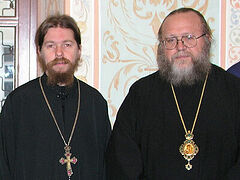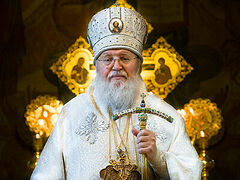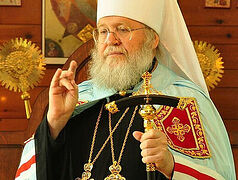When Metropolitan Hilarion (Kapral), First Hierarch of the Russian Orthodox Church Outside of Russia, reposed in the Lord on May 17, my first thought was calling Archpriest Victor Potapov, Rector of our St. John the Baptist Cathedral in Washington D.C. For him, Vladyka was not simply a hierarch, but also a dear friend he knew very well for fifty-five years. When I expressed my condolences to the batiuhska with regards to the passing of his dear friend, he offered his condolences in return saying that Vladyka was dear to everyone in the Russian Orthodox Diaspora. That’s how he began his story.
 Metropolitan Hilarion (Kapral) and Archpriest Victor Potapov
Metropolitan Hilarion (Kapral) and Archpriest Victor Potapov
Of all seminarians in their year group, only four graduated from the seminary
In 1967, of a previous century, at the age of eighteen, I entered the Holy Trinity Seminary in Jordanville. Another nineteen-year-old young man, a shy Ukrainian Canadian named Igor Kapral, who barely spoke Russian, also came there. Frankly, I also could barely speak Russian then.
At the time, our class was considered quite big—it consisted of twelve freshmen. But when we graduated, there were only four of us left: besides Vladyka and myself, the other two who also went through graduation were today’s Archpriest Sergiy Kotar and a monk who, sadly, quit monasticism a few decades later. Besides, Protopresbyter Valery Lukianov, a rector of many years of the St. Alexander Nevsky Diocesan Cathedral in New Jersey, studied with us via the correspondence course, but he was a lot older than us. He also successfully graduated from the seminary.
The seminarians lived practically like the monastics: they were at church daily and kept to all fasting rules. The meals were quite meager to a man of the world
Many left because they couldn’t withstand the challenges and realized that this life wasn’t for them. First of all, if the subject of the study doesn’t interest you, it is really hard to keep studying. Besides, we should keep in mind that the climate in Jordanville is quite demanding—it’s very cold and damp there in winter. On top of everything else, we were expected to practically lead the life of the monastics: attend the church daily, keep to fasts and make do with the meals that were rather scanty to those of the world who are used to eating meat. Some of us couldn’t take it.
In his youth, Igor was a parishioner of the Moscow Patriarchate church in Edmonton, and later became a spiritual son of Bishop Sava (Saračević) of Edmonton. An ethnic Serb, Bishop Sava headed the ROCOR diocese. For, even if we are the Russian Church, we also bring together a great number of other ethnicities—there were and still are the Russians, the Ukrainians, the Belarusians, the Americans, the Serbs, the Bulgarians, the Georgians, the Greeks, the Kyrghiz, the Uzbeks, the Kazakhs, the Koreans, the Azerbaijanis, the Chinese, and the African Americans among our laity, clergy, and even episcopate.
 Metropolitan Hilarion with Maria Potapova Bishop Sava was, like we would say in days of old, a “special” friend of the holy hierarch John (Maximovich) and he had a great influence over the future Vladyka Hilarion. The latter got so involved and so deeply immersed in the life of the church, that he voiced his desire to continue his studies in a seminary in Russia.
Metropolitan Hilarion with Maria Potapova Bishop Sava was, like we would say in days of old, a “special” friend of the holy hierarch John (Maximovich) and he had a great influence over the future Vladyka Hilarion. The latter got so involved and so deeply immersed in the life of the church, that he voiced his desire to continue his studies in a seminary in Russia.
But Vladyka Sava suggested that he abandon his plan of studying in communist Russia, but receive a theological education in Jordanville instead. Vladyka Hilarion heeded his advice and went there. And that’s how we met.
There were overall not more than forty seminarians studying there at the time. All freshmen were settled in the so-called general cell room with bunk beds. We lived there for six or seven months and shared one bathroom. We slept on war-era bunk beds: the late Nikolai Nikolayevich Alexandrov, the first dean of the Holy Trinity Seminary, used to source out the retired American military supplies for free, and many of us, for example, were wearing the US Air Force overcoats in winter at the time.
We were assigned double rooms, and I ended up sharing a room with the future Vladyka Hilarion—known simply as Igor then
Later on, we were given double rooms and I ended up sharing a room with the future Vladyka Hilarion—known simply as Igor then. He took an upper bunk bed and I had the lower berth. We shared a room for several months and became very close friends. I took a great liking to him, as he was a truly honest man who was free from any duplicity. There was no “façade” in him that might hide something quite opposite to the apparent.
He became an intimate friend not only for me, but also to many other seminarians. I can’t remember anyone ever criticizing or chastising him. He was the general favorite.
Obedience was Vladyka’s way of life
Surely, the seminarians were young, and it is only natural to be reckless in youth. I have to be honest with you—at times, I did allow myself some minor mischief. But Vladyka Hilarion never did anything of this sort. From the first day in the seminary, he hardly ever went outside of the Holy Trinity Monastery until the time he became a bishop.
Vladyka truly never enjoyed leaving the monastery, besides, he didn’t have the possibility to do so. On top of everything, he took manyof obediences upon himself. For example, he was an editor of the English language edition of the “Orthodox Life” missionary magazine and he did a lot of English translations of Russian spiritual writings. Fr. Hilarion used to help everyone who ever needed it, he was always willing to help, and everyone sought out his help. He was very involved in assisting the paralyzed Archbishop Averky (Taushev) when he was his cell attendant and he spent literally day and night with him over the course of several years.
Jordanville was well suited to his character and temperament. It is known for its really busy monastic life—not only in the matter of the prayer life, but also in obedience and missionary activities. It was where the Orthodox spiritual writings were published in English for the first time in the Russian Diaspora. In this respect, the Holy Trinity Monastery has always been a forward-thinking place. Vladyka inherently enjoyed sharing Orthodoxy with others, helping others discover the beauty of our faith. For him, the monastery was an ideal place in the sense that it allowed him to publish books, meet the pilgrims who arrived in great numbers and show them what the monastic life is about. Besides, he sang wonderfully.
Overall, Vladyka Hilarion was an extremely busy person, and everyone relied on him; so he simply didn’t have a chance to leave the monastery.
Frankly speaking, I can’t say that I ever shared any general obediences with him. One exception being the farming, since the monastery owned a rather large farm during those years. It had a huge piece of land at its disposal and we had to gather the harvest there. The tractor would sheaf the hay up and we, the seminarians, had to follow it by heaping the sheaves onto a cart. The monks, together with the students, were all involved in this obedience.
But Vladyka Hilarion also had special obediences I never had. For example, he typeset the text in the printing office—a job he enjoyed doing and was very efficient at. He took his job quite seriously. As the monks say, obedience is above fasting and prayer. For him, obedience was a way of life.
On top of everything else, Vladyka attended the early-morning services, he enjoyed the prayers and the liturgical life. He inspired me to do the same: I preferred to skip the seminary prayers at 7 a.m., and instead attended the Midnight Office with him—a special monastic service that started at 5 a.m. It lasted approximately forty-five minutes and I knew that I would have enough time left to either do some studies or take a nap before the classes commenced. For me, such a service had a practical meaning, but for him, it was a way of life. He prepared himself for monasticism—it was obvious. Everyone knew that he would be a monk and not a married priest.
Vladyka was destined to be a monk
It was the time when I also seriously contemplated monasticism. In 1970, I went to Mt. Athos for the first time and then travelled to Jerusalem, where I met my future matushka. But, realistically, in my case, such thoughts were merely youthful dreams. I saw that a lot of young people entered the monastery assuming that they will become monks, as it had a certain flair of romanticism, but then they suddenly realized that this life wasn’t for them and left. Vladyka Hilarion was one of the few chosen ones I have ever met in my life who I knew from the very first moment that he wanted to and would be a monk.
I would later tell everyone who had doubts about the necessity of monasticism: look at Vladyka—he is born for monasticism. He loved everyone; he wasn’t above matrimony (God forbid!), but monasticism was an ideal for him. And he fulfilled himself in it.
Certainly, the monks from Jordanville saw and supported this aspiration in him in every possible way. I recall how during our years at the seminary they’d often stop by to reassure him. They saw in him their future brother, so they shared advice and exchanged spiritual literature with him. Vladyka enjoyed those meetings.
 With his godson Sergey Potapov and his wife Katherine
With his godson Sergey Potapov and his wife Katherine
He also enjoyed reading spiritual works. I remember, it was late, probably around 11 pm, and we had to get up at 4:30 am to attend the Midnight Office. But he was so immersed in reading that his heart was overflowing with loving tenderness: “Victor, listen!” And he’d read aloud about the martyrs of the first centuries of Christianity, how they so loved Christ that they were eager to give their precious earthly lives in order to receive a seal, ending it with “Amen!” all for the sake of love of Christ. I was stunned.
We usually listened to the lives of the saints at our mealtimes in the monastery. But our minds wandered off as we ate, especially since some readers couldn’t read aloud very well, so it often fell on deaf ears. As for Vladyka, the hagiography was akin to living water. So, whenever he read it or, out of pure contrition of his heart, shared with me, I valued it highly. It is hard to express but I felt then that their lives hold invaluable meaning. I realized why the example of these martyrs was so important for the first Christians. Their blood is at the foundation of the Church. Vladyka Hilarion understood it earlier than others; that’s why he had such a great reverence for them. Without doubt, he taught me to read such texts.
I don’t remember ever seeing Vladyka without a book. We often drove together somewhere, and he always kept some kind of a book with him in a car. He literally swallowed up the literature
I don’t remember ever seeing Vladyka without a book. We often used to drive together somewhere, and he always kept some kind of a book with him in a car. He literally swallowed up the literature. He also owned a vast personal library in the Synod. He didn’t just collect the books, like I did, for example. I simply have trouble parting with books, but I am far from reading all of my books. It is a good intention, but, since I serve at a large parish, it is difficult to find time for reading, yet I surely do try. Vladyka would never quit reading. He had a phenomenal memory of faces, names, and the literature as well. That said, he neither flaunted nor boasted of having read such and such amazing work or that he could speak about it.
Interestingly, despite being so well read and having an amazing memory, he wasn’t known for eloquence of speech; he didn’t know how to speak beautifully. I always keep saying, sure, maybe it is true, but his whole life was pure eloquence. He taught others by his example, and everyone loved and valued him—even those who criticized the Vladyka for being unable to say “no” when it was necessary. I can’t recall if he ever had any enemies—besides the common enemy of our salvation. If Vladyka made any mistakes, he made them solely because of love. He tried not to aggrieve anyone, he loved everyone and was exceptional in this respect. I am talking about it right now and the tears well up.
The word “Me” never existed for him
I can’t ever recall meeting a person like him in my life. Without question, St. John of Shanghai and San Francisco was such a man, but I didn’t happen to know him in person. Metropolitan Hilarion was, without doubt, a righteous man. He was surely never looking for self-glory, a bishop’s or metropolitan’s throne. His desire was to live and work in the monastery for the glory of God. He was definitely a man with no ambitions.
My son became a solid person thanks to Vladyka’s prayers
Our friendship grew stronger with the passing years. We remained friends and loved one another even more than in the seminary. Of course, he was no longer the Igor I knew since he was tonsured with the name of Hilarion: I couldn’t call him by his secular name because he was already a completely different man. However, throughout our lives, we remained on first-name terms. I could always call him, he’d pick up the receiver, and accept my invitation to come and serve at our church in Washington; we shared a lot of common causes.
A few years after graduating from the seminary, Vladyka became godfather to my second son Sergey. We dreamed of being related spiritually even earlier when our oldest son, Mark, was born. But Vladyka Averky didn’t give his blessing for it. He thought that it isn’t a monk’s job to be a godfather; a monk leaves the world to pray for it. As for the godfather, he is expected to live in the world and take care of his godchild.
My son Sergey, his godson, called him by his first name, like the rest of our children; we treated Vladyka as part of our family
But Vladyka Laurus later gave his blessing. He held a different view of these issues and believed that a monk prays and remembers the people in his prayers. As a result, our Sergey became Vladyka Hilarion’s first godchild. He was a troublemaker in his childhood and youth, but, through the prayers of his godfather, he is now a solid person. Vladyka would typically take his roughhousing with a smile. By the way, Sergey called him by his first name, like the rest of our children; we treated Vladyka as part of our family.
Vladyka was inherently a missionary
Vladyka was inherently a missionary. He was Ukrainian by birth, Russian by spirit, but, above all—he was Orthodox. An Orthodox believer, let alone a clergyman or a hierarch, can’t live a sheltered life and hold the light of faith under wraps.
As a hierarch is vested in a church, the following words are spoken: “May Thy light so shine before men, that they may see Thy good works and give glory to our father who is in heaven.” It means that the hierarch must preach, spread the faith in Christ and he shouldn’t conceal it. Vladyka Hilarion did this with his life—his life was his sermon.
Vladyka Hilarion understood it at the very beginning of his spiritual path. Like I said before, he translated to English the classical spiritual works—the lives of the saints, the holy hierarchs Theophan the Recluse and Ignatius (Brianchaninov). During our seminary years, he even gave me some articles to translate into English, even though it wasn’t really my thing. Once be became a bishop, he formed new communities in various locations of our Eastern American Diocese, and later in Australia, particularly in the southern states. He was equally loved by everyone—the Americans, the Russians, and the representatives of other nationalities flocking to our parishes. We also have a great number of American priests who converted to Orthodoxy and headed these communities. Even today, in these times of hardship, none of them have considered leaving the Russian Church. Owing to Vladyka Hilarion, who to the end has remained a devout missionary, they understand that the Church stands above politics.



